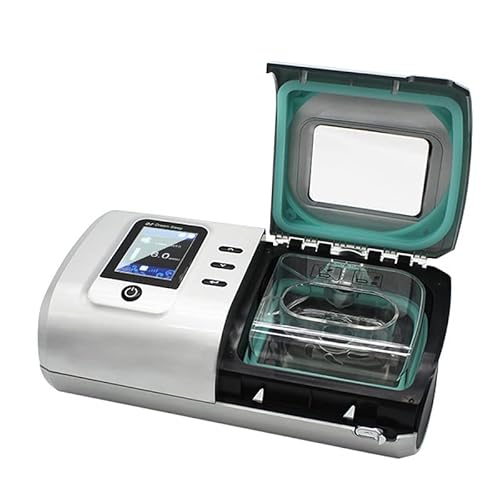Many users struggling with sleep apnea wonder can using a CPAP machine cause weight loss? While CPAP therapy does not directly burn calories or fat, it radically improves the metabolic and energy conditions required for successful weight management.
Can using a Cpap machine cause weight loss? No, using a CPAP machine does not directly burn fat or inherently cause weight loss. Instead, effective Continuous Positive Airway Pressure (CPAP) therapy manages Obstructive Sleep Apnea (OSA), drastically improving metabolism, boosting daytime energy, and balancing crucial appetite-regulating hormones. This stabilization of bodily systems creates optimal conditions for successful weight management, making sustained fat reduction significantly easier.
The Indirect Mechanism: Energy and Activity
The most immediate and critical benefit of successful CPAP therapy relates to dramatically improving energy levels. Untreated Obstructive Sleep Apnea (OSA) is characterized by hundreds of micro-arousals nightly as the patient briefly wakes up to breathe. This prevents the body from reaching deep, restorative sleep cycles.
🛒 Recommended Product
The resulting severe sleep deprivation manifests as chronic fatigue during the day, making physical activity and exercise extremely difficult. A person struggling with OSA typically lacks the stamina and motivation necessary to achieve a caloric deficit through movement.
Consistent use of the CPAP device restores restful sleep by preventing airway collapse. This immediate increase in daytime alertness and stamina allows patients to engage reliably in physical activity. This return to an active lifestyle is the primary behavioral pathway through which weight loss is facilitated following the start of CPAP therapy.
Addressing Metabolic and Hormonal Factors
The impact of sleep apnea is not just about feeling tired; it profoundly disrupts the body’s internal chemistry, creating a biological environment highly conducive to weight gain, specifically targeting stubborn fat stores.
Cortisol and Inflammation
Untreated sleep apnea acts as a major source of physiological stress. Each time the oxygen saturation drops and the body fights to breathe, the central nervous system registers a crisis, elevating the stress hormone cortisol. High, sustained cortisol levels signal the body to store fat, particularly visceral fat located around the abdominal organs, which is linked to insulin resistance and metabolic syndrome.
Effective CPAP therapy stabilizes breathing patterns and normalizes oxygen levels overnight, reducing the body’s perceived stress load. This lowered cortisol level helps restore metabolic balance, making it easier for the body to utilize fat stores for energy.
Ghrelin and Leptin
One of the most powerful mechanisms linking CPAP use to better weight control involves the regulation of appetite. Sleep deprivation severely disrupts the balance between two key hunger hormones:
- Ghrelin: The “go” hormone that stimulates appetite and signals hunger.
- Leptin: The “stop” hormone that signals satiety and fullness.
Studies published by the University of Chicago and other research bodies have repeatedly shown that insufficient sleep causes Ghrelin levels to rise and Leptin levels to fall. This hormonal imbalance creates intense cravings for high-calorie, carbohydrate-rich foods and impairs the ability to feel satisfied after eating, leading to overconsumption.
🛒 Recommended Product
Restored, high-quality sleep achieved through CPAP therapy normalizes these appetite-regulating hormones. Patients often report reduced cravings, better portion control, and a natural ability to adhere to a healthy diet plan, neutralizing a major physiological barrier to weight reduction.
Dispelling the Myth: CPAP is Not a Guarantee
While the biological advantages are significant, it is important to clarify that CPAP is a medical treatment for a breathing disorder, not a primary tool for weight loss. The therapeutic benefit is an indirect effect that varies widely among individuals.
Some patients who faithfully use their CPAP machine experience rapid weight loss within the first few months, fueled by their renewed energy and improved appetite control. However, a small percentage of users may experience slight initial weight gain. This is thought to occur because the body is no longer struggling and expending massive amounts of energy nightly just to stay alive, slightly reducing the basal metabolic rate.
For CPAP to facilitate sustained weight loss, it must be combined with proactive lifestyle changes:
- Adherence: The CPAP machine must be used every night, all night, for the full benefits.
- Diet: A balanced, calorie-controlled diet remains essential.
- Exercise: Utilizing the regained energy for consistent physical activity is necessary to burn calories.
Clinical Evidence and Expected Outcomes
Research consistently supports the notion that CPAP adherence aids weight management. A long-term study published in the journal Sleep Medicine confirmed that patients receiving sustained CPAP treatment showed significantly greater long-term success in reducing Body Mass Index (BMI) compared to those who did not adhere to the therapy.
The primary goal of the treatment is to reduce the Apnea-Hypopnea Index (AHI)—the measure of apnea and hypopnea events per hour. As the AHI drops, the severity of the associated metabolic disruptions decreases, and the body’s ability to efficiently manage weight improves.
The question of can using a Cpap machine cause weight loss is best understood through the lens of metabolic restoration. By removing the physiological barriers created by chronic sleep apnea, CPAP therapy allows the body to effectively respond to traditional weight loss efforts.
🛒 Recommended Product
| Factor | Untreated Sleep Apnea | Effective CPAP Therapy |
|---|---|---|
| Hunger Signals (Ghrelin/Leptin) | Disrupted (Leads to overeating/cravings) | Normalized (Aids portion control) |
| Stress Hormone (Cortisol) | Elevated (Encourages fat storage) | Reduced (Aids fat mobilization) |
| Energy for Exercise | Low/Non-existent | Significantly Increased |
| Metabolism | Stressed/Inflamed | Stabilized and efficient |
In summary, while the answer to can using a Cpap machine cause weight loss is technically no, the device is instrumental in optimizing the body’s internal systems for successful weight management. CPAP therapy provides the foundational restoration of energy and metabolic health necessary for individuals with OSA to achieve sustainable weight reduction goals.
Scientific References & Research
The following peer-reviewed research papers provide additional scientific context:
-
M Lebret et al. (2017).
Factors contributing to unintentional leak during CPAP treatment: a systematic review
[External Link] -
R Bodington et al. (2018).
Travel with CPAP machines: how frequent and what are the problems?
[External Link] -
I Smith et al. (2009).
Pressure modification for improving usage of continuous positive airway pressure machines in adults with obstructive sleep apnoea
[External Link]
Note: External research links are provided for educational purposes and do not necessarily represent endorsement.
Frequently Asked Questions About Can Using a Cpap Machine Cause Weight Loss?
Q. How does treating sleep apnea with CPAP influence metabolic processes related to weight?
A. Untreated sleep apnea can disrupt insulin sensitivity and increase levels of ghrelin, the hunger hormone, while lowering leptin, the satiety hormone. CPAP therapy helps restore normal sleep patterns, which can normalize these hormonal balances, making it easier for patients to manage their weight.
Q. If a patient experiences weight loss after starting CPAP, what is the most common contributing factor?
A. The primary contributing factor is usually the dramatic increase in daytime energy and reduction in fatigue. This allows patients to be more physically active, engage in exercise, and have the mental clarity necessary to make healthier dietary choices, which are the true drivers of weight loss.
Q. Could the reduction in daytime sleepiness achieved by CPAP use result in a significant calorie deficit over time?
A. Yes, by increasing energy levels, CPAP users are less likely to choose sedentary activities and are more likely to participate in physical exercise. This sustained increase in non-exercise activity thermogenesis (NEAT) and intentional exercise can create a sustainable calorie deficit leading to gradual weight loss.
Q. Are there specific medical studies that correlate CPAP adherence with successful weight management?
A. Many studies indicate that CPAP compliance is often associated with improved cardiovascular health markers and better overall metabolic function. While few studies cite weight loss as the *direct* effect, they strongly support that CPAP makes successful weight management efforts (diet and exercise) significantly more achievable.
Q. Is it possible for weight gain to occur after starting CPAP therapy?
A. Weight gain after starting CPAP is uncommon but possible if the patient’s eating and exercise habits change negatively. However, in most cases, if a patient initially loses weight but then stops adhering to therapy, they often regain the lost weight due to the return of metabolic and hormonal disruption.
Related Articles
What Is the Best Workout Machine for Weight Loss?
Trying to determine what is the best workout machine for weight loss? While several options deliver results, the rowing machine often provides the max…
Do Vibrating Weight Loss Machines Work?
Do vibrating weight loss machines work? The scientific data is clear: while these vibration therapy plates offer proven benefits like muscle stimulati…
Treadmill Workouts for Buttocks: Sculpt and Tone Your Glutes
Getting fit and shaping your buttocks can be challenging. Treadmill workouts might be the solution you need. Treadmill workouts are not just for cardi…
When you purchase a product through Amazon links on EllipticalKing.com, we may earn a small commission at no extra cost to you. This helps support the site and keep our content free. As an Amazon Associate, We earn from qualifying purchases




